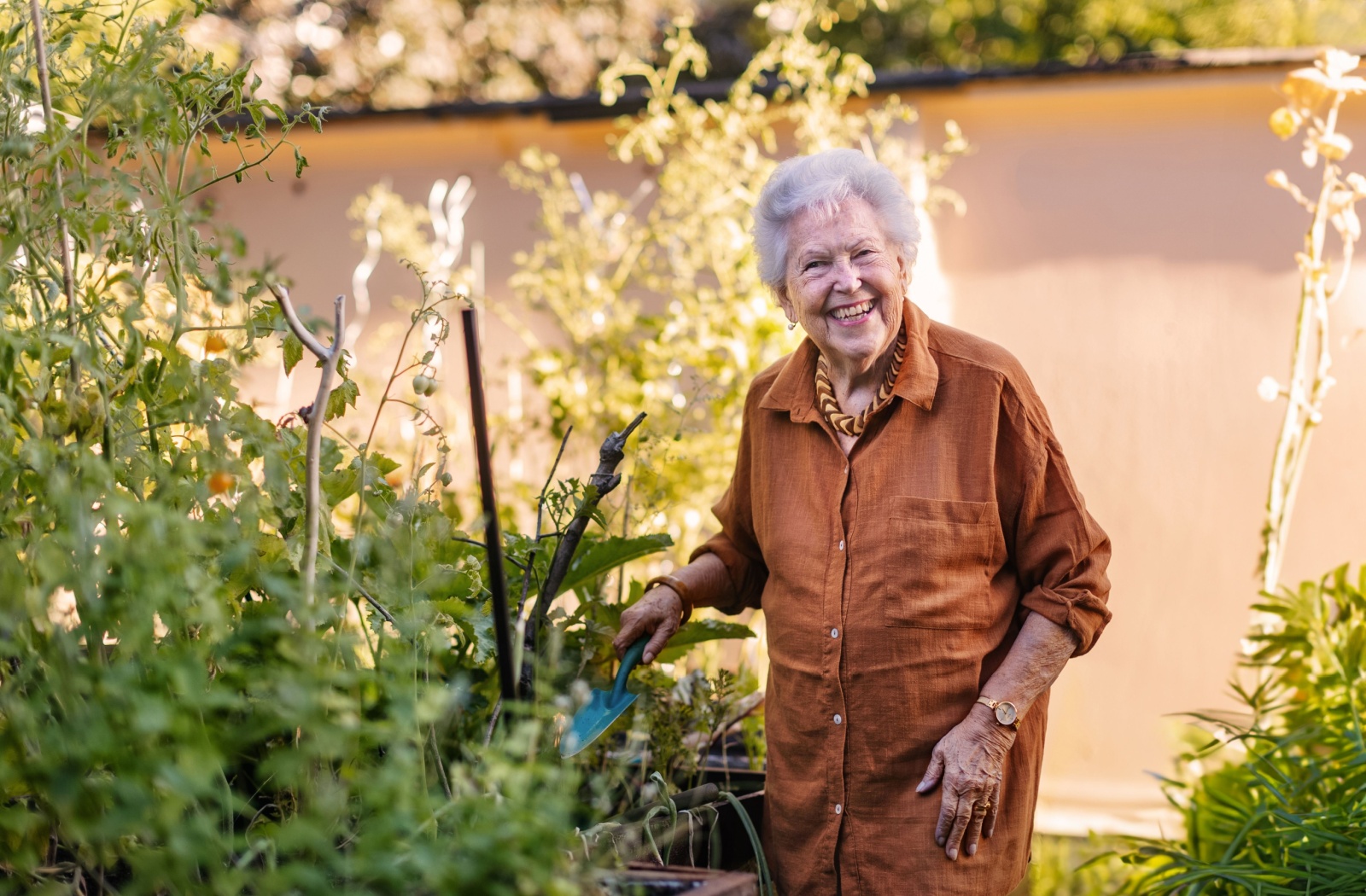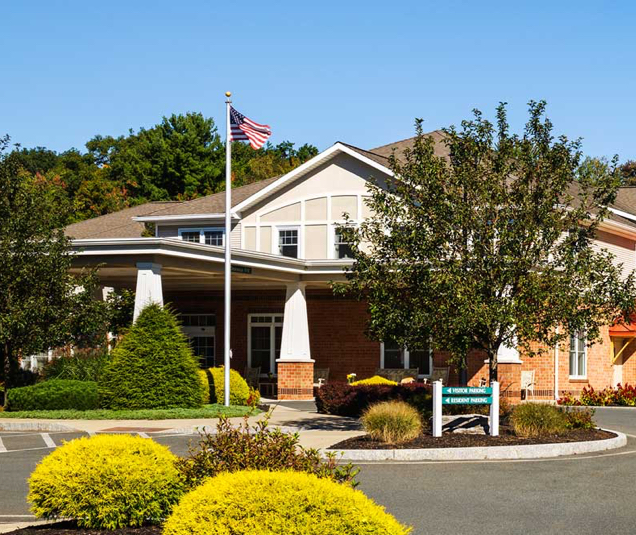As we grow older, it becomes more important to maintain connections to family, community, purpose, and the natural world. One of the most effective yet often overlooked ways to support overall well-being in older adults is by spending time outdoors.
From a gentle breeze to the smell of blooming flowers, nature provides a wide range of physical, mental, and emotional benefits that support healthy aging.
Access to safe and inviting outdoor spaces can make a significant difference in quality of life for seniors living in assisted living communities. Whether it’s a peaceful walk, gardening in a raised bed, or simply sitting in the sun, nature offers everyday moments that restore, inspire, and uplift.
The Connection Between Nature & Senior Wellness
Spending time in nature can profoundly impact seniors’ overall health, supporting both physical vitality and emotional well-being in simple yet deeply effective ways.
Physical Benefits of Time Outdoors
Nature encourages movement, which plays a critical role in healthy aging. Spending time outside supports:
- Mobility & balance
- Uneven terrain helps strengthen stabilizing muscles & improve coordination
- Heart health
- Time in nature has been shown to lower blood pressure & heart rate
- Vitamin D production
- Sun exposure helps regulate calcium levels & supports immune function.
- Improved sleep
- Natural light exposure supports the body’s circadian rhythms, making sleep more restful
Mental & Emotional Benefits
The impact of nature on mental health is equally impressive. For seniors, spending time outdoors promotes:
- Stress reduction as being in natural surroundings helps lower cortisol levels & reduces anxiety
- Mood elevation as sunshine & fresh air are linked to increased serotonin levels
- Enhanced memory & focus with exposure to nature reduce mental fatigue & restore concentration
- A sense of purpose as nurturing plants or participating in outdoor activities offers a fulfilling routine
Gardening: A Meaningful Connection to the Outdoors
Gardening offers numerous benefits, particularly as it’s a highly accessible nature-based activity for older adults. It’s a sensory-rich experience that encourages light exercise, cognitive engagement, and emotional satisfaction. Common benefits of gardening include:
- Physical movement through tasks like planting, weeding, & watering
- Cognitive stimulation from planning, organizing, & caring for plants
- Emotional fulfillment as residents watch their gardens bloom & grow
- Social interaction while working alongside neighbors on shared projects
The Value of Resident-Maintained Garden Beds
Raised, resident-maintained garden beds make gardening accessible for seniors of all mobility levels. These beds allow residents to participate comfortably—whether standing, seated, or using mobility aids.
Each season, residents can grow herbs, vegetables, flowers, or decorative plants, creating a beautiful and deeply personal space.
Garden beds also become community hubs where friendships blossom alongside the flowers. Residents can take pride in their care; the gardens become living symbols of what they can nurture and accomplish.

Nature as a Daily Routine
Not every interaction with nature needs to be planned or structured. Some of the most meaningful benefits come from small, consistent habits:
- Enjoying a cup of coffee on the patio
- Taking in the morning sun during a daily walk
- Watching birds at a feeder or squirrels in the trees
- Breathing in fresh air & listening to natural sounds
These simple outdoor rituals offer mental clarity and a sense of calm, making them ideal for seniors seeking stability and comfort.
Natural Light & Mood Regulation
Spending time in daylight—even for short periods—can dramatically impact a senior’s mood. Natural light exposure helps regulate sleep patterns, boosts energy levels, and combats feelings of isolation or sadness.
For residents who experience seasonal depression or reduced activity in the winter months, even 15 minutes outside can offer a noticeable lift in mood.
Outdoor Activities That Foster Connection
Outdoor spaces in assisted living communities are more than just gardens and patios—they’re gathering places. Residents can enjoy a variety of social and recreational activities that take place outside, such as:
- Nature walks & light exercise sessions
- Chair yoga or gentle stretching under shaded trees
- Outdoor painting, crafts, or bird-watching clubs
- Gardening parties or seasonal planting events
- Alfresco meals, cookouts, or happy hour on the patio
These activities are not only fun—they also help foster friendship and belonging among residents, team members, and families.
Celebrating the Seasons
Seasonal changes offer natural opportunities to stay engaged and inspired:
- Residents can plant seeds and watch their garden beds come to life in spring
- In summer, they can enjoy the fresh air and vibrant colors
- Autumn brings opportunities for harvesting & decorating with natural materials
- Winter might include feeding birds or enjoying a snowy view from a cozy bench.
By embracing the rhythms of nature, seniors stay more connected to the present moment and the changing world around them.
The Role of Nature in Memory Support
For individuals living with Alzheimer’s or other forms of memory loss, nature provides gentle, nonverbal engagement. A familiar flower, the sound of rustling leaves, or the scent of fresh herbs can evoke comfort and pleasant memories.
Outdoor spaces designed for memory support help reduce agitation and anxiety while encouraging calm, curiosity, and joy. Raised beds, accessible walking paths, and quiet sensory gardens offer safe, structured ways to interact with the natural world.
Nature as a Therapeutic Tool
Incorporating natural elements into memory care programs supports emotional well-being. Activities like tactile gardening, nature journaling, or simply spending time outdoors create positive emotional responses and help residents feel grounded.
Designing Outdoor Spaces for Accessibility
Assisted living communities design their spaces with accessibility in mind so every resident can benefit from outdoor time. Important design features include:
- Wide, stable walking paths
- Shaded seating areas & comfortable furniture
- Handrails, visual markers, & non-slip surfaces
- Raised garden beds at wheelchair-accessible height
- Clear signage & gentle lighting for evening use
When outdoor areas are easy to access, residents can feel more confident. They’re more likely to explore independently or with others.
Let Nature Nurture at Peregrine Senior Living
Nature offers powerful support for physical and emotional well-being—especially for seniors. At Peregrine Senior Living at Delmar Place, we provide thoughtfully designed green spaces, resident-maintained garden beds, and daily opportunities for meaningful connections with nature.
Our community is rooted in the idea that nature belongs in every season of life—and we’re here to help each resident flourish. Schedule a visit today and discover how our outdoor living spaces are helping seniors grow, thrive, and feel at home.













No more posts